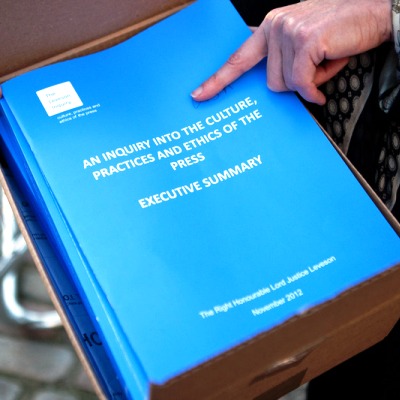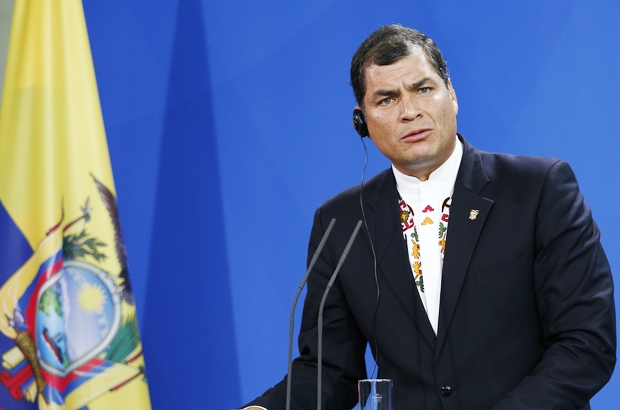Index relies entirely on the support of donors and readers to do its work.
Help us keep amplifying censored voices today.

In an editorial published this morning, the Financial Times announced its support for the Royal Charter on press regulation put together by the newspaper industry.
The article said that while the FT agreed with the need for a “robust and independent regulation”, a new regulator should be “proportionate and sustainable.”
The article continued:
“Well-meaning reforms should not open the door to state interference in Britain’s free press.”
Acknowledging that the press had reluctantly accepted that there would be a royal charter for regulation of the press, the Financial Times argued:
[C]ertain points are non-negotiable. If press freedoms are to be preserved, the regime must be genuinely voluntary. It should also balance public protection with freedom of expression. A financially weak press should not be loaded with onerous obligations that deter it from pursuing contentious issues, where reporting serves the public interest and holds the powerful to account.
The industry’s plans to create the Independent Press Standards Organisation were revealed earlier this month. Index on Censorship greeted the proposal as “a starting point for proper discussion on the future“.
Hacked Off, which supports the government’s regulation proposal, reacted angrily to the Financial Times’ suggestion that that document had been “assembled over pizza in the early hours of the morning this spring”.
Director Brian Cathcart denied his group had been present at late-night negotiations, pointing out: “No pizza was served, or at least we saw none.”
Proposed laws will not calm President Correa’s stormy relationship with the press, says Padraig Reidy

Ecuadorian president Rafael Correa. Pic: Reynaldo C Paganelli/Demotix
Yesterday’s announcement by several newspaper groups that they had launched their own royal charter for press regulation was met with anger by Hacked Off campaigners and, to be frank, confusion by the public at large.
Index, for our part, welcomed the rejection of the government’s royal charter, while still being opposed to the papers’ royal charter.
Why? Well, there’s the issue that Index doesn’t really want there to be any royal charter, at all, no matter who’s dreamt it up. It still creates the prospect of external political approval of press regulation.
There’s also a problem that the papers’ version of the charter gives them a veto over appointments to the regulatory board, which risks the regulator being seen as a tool of the industry, just as the PCC was perceived to be.
Then there’s the issue that it doesn’t really address the problem of the threat of exemplary damages for those outside the regulator, one of Index’s key concerns.
And it leaves us none the wiser as to the whole “What’s a newspaper/journalist/website/blog?” question, which has been the cause of some confusion (as illustrated by Martin Belam‘s satirical take on the government’s explanatory flowchart below).

Still, the rejection is the interesting part. And the furore over the rejection has somewhat undermined the claims made by government and campaigners that they believed in a wholly voluntary system.
What happens next? By Leveson’s own admission, if a substantial part of the industry refuses to sign up, then the regulator has failed before it has even begun. That is where we seem to be now.
It was interesting to note that in his interview on BBC radio’s World At One yesterday, Peter Wright, who has been leading the discussion for Associated, Telegraph and News International publications, said that the other papers who are not part of that group saw the alternative royal charter proposal as a way to “get the ball rolling again” on negotiations over reform. That would suggest that even Wright sees this merely as the opening gambit in fresh negotiations.
So perhaps now we can start discussing the terms of a new, genuinely independent and voluntary regulator, without the mad rush that led to the government’s ultimately botched effort.
Yesterday’s announcement by several newspaper groups that they had launched their own royal charter for press regulation was met with anger by Hacked Off campaigners and, to be frank, confusion by the public at large.
Index, for our part, welcomed the rejection of the government’s royal charter, while still being opposed to the papers’ royal charter.
Why? Well, there’s the issue that Index doesn’t really want there to be any royal charter, at all, no matter who’s dreamt it up. It still creates the prospect of external political approval of press regulation.
There’s also a problem that the papers’ version of the charter gives them a veto over appointments to the regulatory board, which risks the regulator being seen as a tool of the industry, just as the PCC was perceived to be.
Then there’s the issue that it doesn’t really address the problem of the threat of exemplary damages for those outside the regulator, one of Index’s key concerns.
And it leaves us none the wiser as to the whole “What’s a newspaper/journalist/website/blog?” question, which has been the cause of some confusion (as illustrated by Martin Belam‘s satirical take on the government’s explanatory flowchart below).

Still, the rejection is the interesting part. And the furore over the rejection has somewhat undermined the claims made by government and campaigners that they believed in a wholly voluntary system.
What happens next? By Leveson’s own admission, if a substantial part of the industry refuses to sign up, then the regulator has failed before it has even begun. That is where we seem to be now.
It was interesting to note that in his interview on BBC radio’s World At One yesterday, Peter Wright, who has been leading the discussion for Associated, Telegraph and News International publications, said that the other papers who are not part of that group saw the alternative royal charter proposal as a way to “get the ball rolling again” on negotiations over reform. That would suggest that even Wright sees this merely as the opening gambit in fresh negotiations.
So perhaps now we can start discussing the terms of a new, genuinely independent and voluntary regulator, without the mad rush that led to the government’s ultimately botched effort.